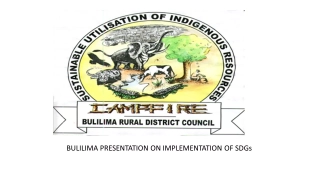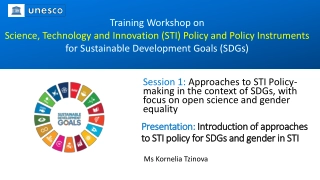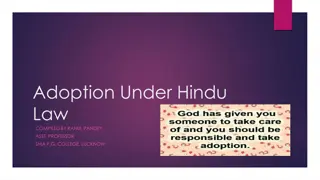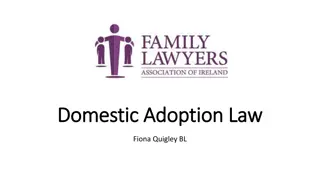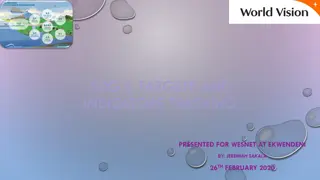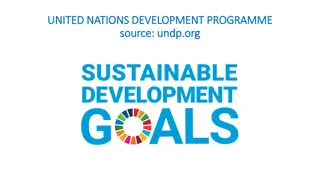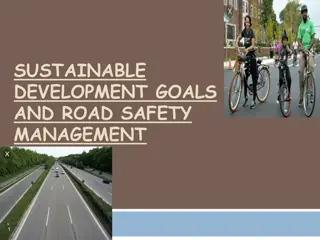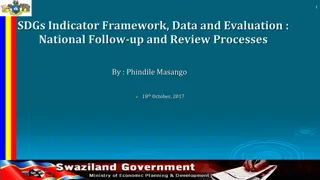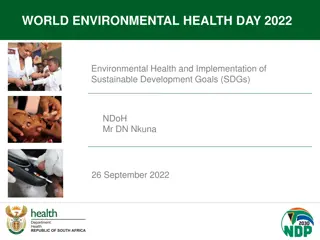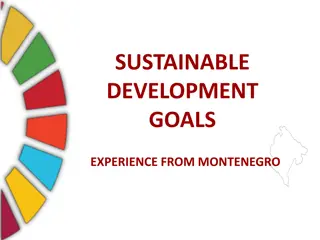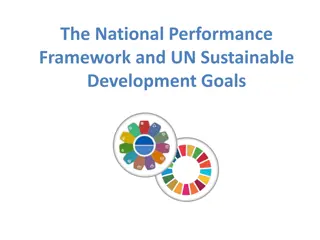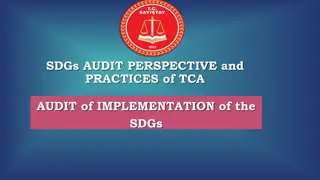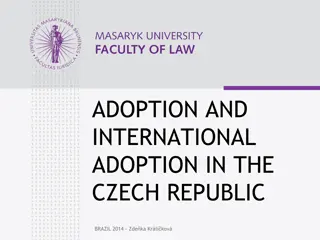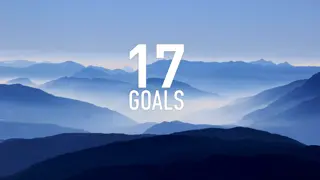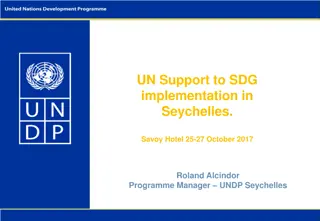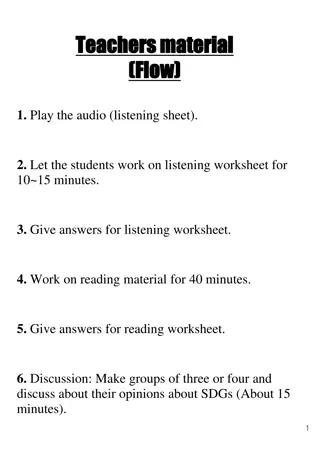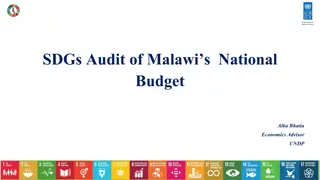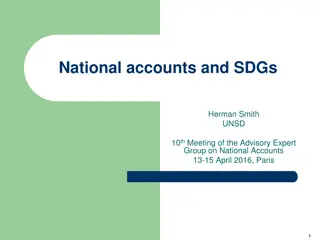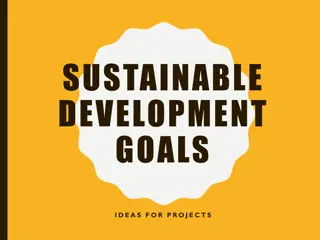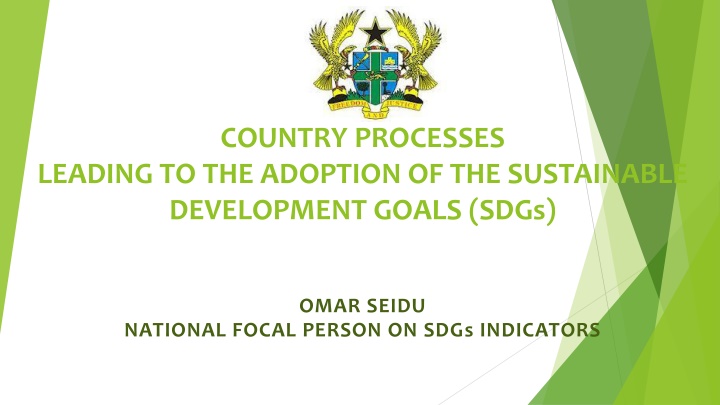
Sustainable Development Goals (SDGs) Adoption Processes and National Committees
The process leading to the adoption of the Sustainable Development Goals (SDGs) involved various national committees and negotiations, with a focus on eradicating poverty and promoting sustainable development. This presentation outlines the background, justification, and roadmap for the SDGs, highlighting Ghana's involvement in the post-2015 development agenda.
Download Presentation

Please find below an Image/Link to download the presentation.
The content on the website is provided AS IS for your information and personal use only. It may not be sold, licensed, or shared on other websites without obtaining consent from the author. If you encounter any issues during the download, it is possible that the publisher has removed the file from their server.
You are allowed to download the files provided on this website for personal or commercial use, subject to the condition that they are used lawfully. All files are the property of their respective owners.
The content on the website is provided AS IS for your information and personal use only. It may not be sold, licensed, or shared on other websites without obtaining consent from the author.
E N D
Presentation Transcript
COUNTRY PROCESSES LEADING TO THE ADOPTION OF THE SUSTAINABLE DEVELOPMENT GOALS (SDGs) OMAR SEIDU NATIONAL FOCAL PERSON ON SDGs INDICATORS
Presentation Outline Background Justification Processes Feeding into the SDGs National Committees on the SDGs The Negotiations The 17 SDGs Roadmap for the Indicators Indicator Matrix for SDG 6
Background The UN Conference on Environment and Development (UNCED) held in Rio de Janeiro, Brazil in 1992 set up a global developmental agenda for the 21st century called the Rio Declaration or Agenda 21. A global development agenda known as the Millennium Development Goals (MDGs) was set up to achieve a number of global targets by 2015. The Rio+20 outcome document, The future we want, inter alia, called for the establishment of an Open Working Group to develop a set of post-2015 global development agenda called Sustainable Development Goals (SDGs) for consideration and appropriate action by the United Nations General Assembly at its 68th session. The document also provided the basis for the conceptualization of the Sustainable Development Goals (SDGs), which were to be integrated into the UN Post-2015 Development Agenda. The Open working Group (OWG) had among other things reaffirmed all the principles of the Rio Declaration on Environment and Development, including, inter alia, the principle of common but differentiated responsibilities, as set out in principle 7 thereof. Thursday, March 13, 2025 3
Justification Poverty eradication is the greatest global challenge facing the world today and an indispensable requirement for sustainable development. Poverty eradication, changing unsustainable and promoting sustainable patterns of consumption and production and protecting and managing the natural resource base of economic and social development are the overarching objectives of and essential requirements for sustainable development. Thursday, March 13, 2025 4
Ghana in the post-2015 development agenda Intergovernmental Content Generation Agreement Process 1st National Consultation (What?) GSGDA II National Open Working Steering Committee (stakeholder engagement, dissemination) CAP 2st National Consultation (localisation) SECTOR POLICIES High-Level Inter-ministerial coordinating committee on SDGs Thematic consultation (Inequalities) 2014 - 2015 2012 - 2013 2014
National Committees on the SDGs HIGH-LEVEL INTER MINISTERIAL COORDINATING COMMTTTEE ON THE SDGs Chaired by the NDPC with the following objectives: 1. Oversee the work of the lnter-Ministerial Technical Committee on SDGs 2. Ensure that national delegates build consensus on relevant national issues and common country position 3. Advocate for financial support for participation of national delegates in the conferences 7
National Technical Steering Committee on the SDGs Chaired by EPA and current secretariat also located in the same institution The committee is made up of 22 MDAs and CSOs (co-opting) Discussions of the committee have provided the basis for negotiations for the country at the Open Working Group Sessions The Committee provided technical inputs for the discussions on the Finance for Development (FfD) framework i.e. the means of Implementation for the SDGs with the Ministry of Finance as the focal Ministry 8
National Technical Steering Committee on the SDGs The committee has made inputs into the on going discussions on the SDG indicators with GSS as the focal point A Communication strategy has been developed for the dissemination of the SDGs nation-wide by the Committee Stakeholder engagements and consultations were held with CSOs to ensure that their concerns and issues were brought on board. The Committee launched CSO s platforms on the SDGs The Committee is working with Youth Groups to establish a National Youth Confab on the SDGs
Intergovernmental Negotiations Two parallel processes Open Working Group Negotiations Inter Agency Expert Group on the Sustainable Development Goals (IAEG- SDGs)
Political Process The phase of the intergovernmental consultations that began in January 2015 culminated in the adoption of an outcome document on September 25, 2015 that included the following main components: (a) Declaration; (b) SDGs and targets; (c) Means of Implementation and Global Partnership for Sustainable Development; and (d) follow-up and review. The process of intergovernmental negotiations on the post-2015 development agenda was open, transparent and inclusive, consistent with the rules of procedure and established practices of the General Assembly
Consultations on SDG Indicators Proposed set of indicators submitted to Member Countries, February 2015 African Union Commission(AUC) organised expert group meetings on the indicators, Pretoria (April) and Algiers (May) GSS in collaboration with National Technical Committee organized a 3-day national stakeholder consultations to review the indicators (May 21-24) prior to the first IAEG meeting Second IAEG-SDGs to be held in Bangkok in October 26-28, 2015
Transforming Our World: The 2030 Agenda for Sustainable Development GOAL 1: End poverty in all its forms everywhere GOAL 2: End hunger, achieve food security and improved nutrition and promote sustainable agriculture GOAL 3: Ensure healthy lives and promote well-being for all at all ages GOAL 4: Ensure inclusive and equitable quality education and promote lifelong learning opportunities for all GOAL 5: Achieve gender equality and empower all women and girls GOAL 6: Ensure availability and sustainable management of water and sanitation for all
Transforming Our World: The 2030 Agenda for Sustainable Development GOAL 7: Ensure access to affordable, reliable, sustainable and modern energy for all GOAL 8: Promote sustained, inclusive and sustainable economic growth, full and productive employment and decent work for all GOAL 9: Build resilient infrastructure, promote inclusive and sustainable industrialization and foster innovation GOAL 10: Reduce inequality within and among countries GOAL 11: Make cities and human settlements inclusive, safe, resilient and sustainable GOAL 12: Ensure sustainable consumption and production patterns
Transforming Our World: The 2030 Agenda for Sustainable Development GOAL 13: Take urgent action to combat climate change and its impacts* GOAL 14: Conserve and sustainably use the oceans, seas and marine resources for sustainable development GOAL 15: Protect, restore and promote sustainable use of terrestrial ecosystems, sustainably manage forests, combat desertification, and halt and reverse land degradation and halt biodiversity loss GOAL 16: Promote peaceful and inclusive societies for sustainable development, provide access to justice for all and build effective, accountable and inclusive institutions at all levels GOAL 17: Strengthen the means of implementation and revitalize the global partnership for sustainable development
Indicators Roadmap Continental workshop (by end of October 2015) for Africa to review the global report on possible indicators and indicator framework November 2015: An electronic platform for the monitoring of the goals and targets will be launched November/December 2015: IAEG-SDGs to submit report on possible indicators and indicator framework reflecting the relevant decisions agreed on by Member States March 2016: The UNSC at its 47th session to discuss and endorse the proposal of the IAEG on SDGs indicators for monitoring the SDGs
Indicators Roadmap June/July 2016: SDG baseline data report for global monitoring will be released, providing data and identifying gaps March/December 2016: Possible release of the national and regional baseline data reports Countries to identify national statistical capacity building gaps (by end 2016) 2016-2020: Scaling-up of national, regional and global capacities to monitor the goals and targets
Next Steps Additional finance and other resources for implementation of the SDGs would be required. The existing implementing agencies under the various ministries will continue to implement the SDGs within the framework of their existing mandates based on regular budgetary allocations Additional Resources from both Internal and External sources will be required Partnerships with all stakeholders required to ensure successful implementation and monitoring
Next Steps Deepening Civil Society involvement in SDG implementation Need to align SDGs with GSGDA II 2014-2017, and other national development plan We have to engage on a strong awareness creation and dissemination drive on the SDGs Private sector interest and buy in It is important that we Localise the SDGs through partnerships with all stakeholders
Food for Thought Percent of de jure population 2008 GDHS 2014 GDHS MDG Target Goal 7 78 78 64 53 15 12 Improved water Improved sanitation, not shared
FINANCIAL RESOURCES WILL BE LIMITTED BUT PEOPLE S INVOLVEMENT AND PARTICIPATION IS LIMITLESS by Pham Binh Minh, Dep PM of Vietnam THANK YOU

